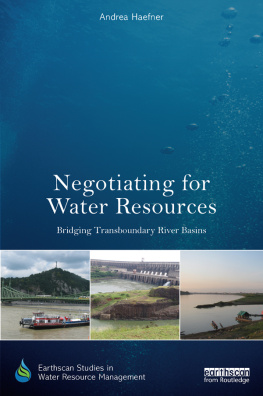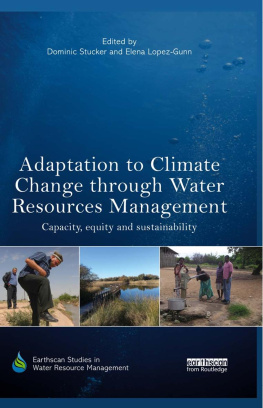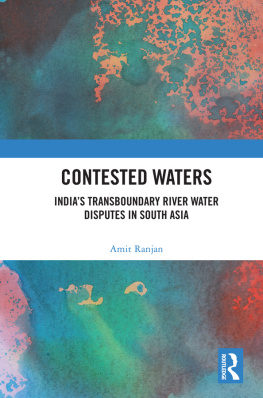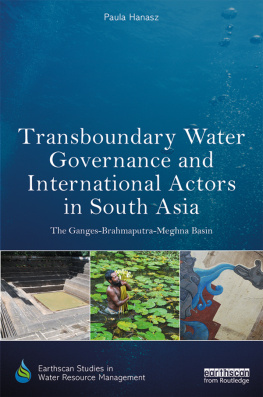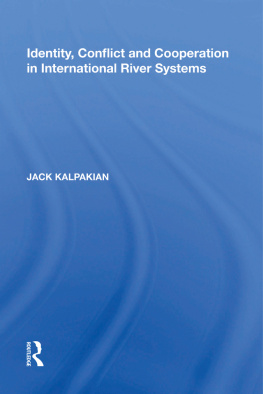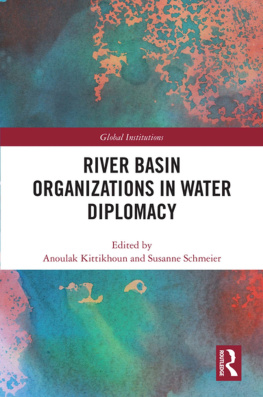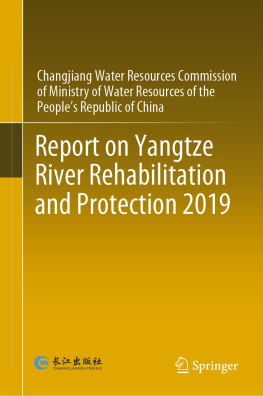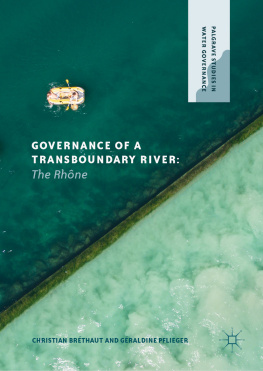Negotiating for Water Resources
Over 90 per cent of the worlds population lives in countries that share a river basin with others. Freshwater resources are scarce and different nations, actors and users compete for limited resources in transboundary river basins; often conflicting with each other. Water is a resource with no substitute: it cannot be secured in sufficiently large quantities through long-distance trade deals; and, due to the interconnectivity of the hydrological system, the actions of one country in its water management have a direct bearing on the interests of neighbouring countries. For instance, in the Mekong River Basin, current hydropower and navigation developments in certain countries impact on traditional sources of income such as fisheries, and rice production in others. These kinds of changes in water use have given rise to conflict between countries in that region and others, but have also led, in some cases, to greater cooperation. The past few decades have seen a number of new agreements about the sharing of river resources and cooperation between riparian states.
Negotiating for Water Resources explores the drivers of conflict and cooperation between states in transnational river basins. Drawing on extensive fieldwork and interviews on the Mekong, Danube and La Plata river basins, the book provides a three-level analysis across three case studies, including the regional framework (EU, ASEAN and Mercosur), the River Basin Organisations (ICPDR, MRC and CIC) and the micro level. The key question of the book is: To what extent do power asymmetries prevent or inhibit cooperation between riparian states over water resources? This is linked to the question of how institutions contribute to mitigate competition for natural resources and how states interact in a multilateral arena. Overall, the book argues that cooperation in transboundary river basins is possible even where there are asymmetric power relations, challenging realist assumptions about competition and conflict over resources.
Andrea Haefner is an Adjunct Research Fellow at the Griffith Asia Institute in Brisbane, Australia, where she also received her PhD. She has previously worked with international and national organisations in Asia and with the German local government. Her research focuses on non-traditional security issues, focusing on environmental security and water governance.
Earthscan Studies in Water Resource Management
For more information and to view forthcoming titles in this series, please visit the Routledge website: http://www.routledge.com/books/series/ECWRM/
Negotiating for Water Resources
Bridging transboundary river basins
By Andrea Haefner
Water Regimes
Beyond the public and private sector debate
Edited by Dominique Lorrain and Franck Poupeau
Legal Frameworks for Transparency in Water Utilities Regulation
A comparative perspective
By Mohamad Mova AlAfghani
Land and Hydropolitics in the Nile River Basin
Challenges and new investments
Edited by Emil Sandstrm, Anders Jgerskog and Terje Oestigaard
Water and Rural Communities
Local politics, meaning and place
By Lia Bryant, with Jodie George
Trans-jurisdictional Water Law and Governance
Edited by Janice Gray, Cameron Holley and Rosemary Rayfuse
The Mekong: A Socio-legal Approach to River Basin Development
By Ben Boer, Philip Hirsch, Fleur Johns, Ben Saul and Natalia Scurrah
Rules, Norms and NGO Advocacy Strategies
Hydropower development on the Mekong River
By Yumiko Yasuda
First published 2016
by Routledge
711 Third Avenue, New York, NY 10017
and by Routledge
2 Park Square, Milton Park, Abingdon, Oxon OX14 4RN
Routledge is an imprint of the Taylor & Francis Group, an informa business
2016 Taylor & Francis
The right of Andrea Haefner to be identified as author of this work has been asserted by her in accordance with sections 77 and 78 of the Copyright, Designs and Patents Act 1988.
All rights reserved. No part of this book may be reprinted or reproduced or utilised in any form or by any electronic, mechanical, or other means, now known or hereafter invented, including photocopying and recording, or in any information storage or retrieval system, without permission in writing from the publishers.
Trademark notice: Product or corporate names may be trademarks or registered trademarks, and are used only for identification and explanation without intent to infringe.
A catalogue record for this book is available from the British Library
British Library Cataloguing in Publication Data
A catalog record for this book has been requested
Library of Congress Cataloging in Publication Data
A catalog record for this book has been requested
ISBN: 978-1-318-66632-0 (hbk)
ISBN: 978-1-135-61944-6 (ebk)
Typeset in Times New Roman
by Sunrise Setting Ltd, Brixham, UK
This book is based on my PhD entitled Cooperation and Conflict in Transboundary River Basins: The Mekong, Danube and La Plata River Basins and would not have been possible without the assistance of many individuals and institutional entities. First, I would like to acknowledge Griffith University for providing me with a generous postgraduate scholarship, without which this research would not have been possible. This also comprises additional funding throughout the duration of my candidature, including fieldwork and grants for travel to South America, Europe and Southeast Asia.
I would like to thank friends, family and colleagues who supported me throughout my PhD and writing the book. My utmost thanks goes to my principal supervisor Professor Andrew ONeil who provided me with feedback, encouragement and support over the duration of my research journey. This book would not have come to completion without the administrative and moral support I received from the Griffith Asia Institute. My deepest thanks go to Kathy Bailey, Meegan Thorley and Natasha Vary, for encouragement and support. My thanks also go to my previous PhD running mates, Greta Nabbs-Keller, Cathy Maloney and Bounthanongsack Chanthalath (Bo) who shared this long journey with me and provided invaluable assistance and friendship. My appreciation also extends to current and past researchers at the Griffith Asia Institute and lecturers at the School of Government and International Relations and the Department of International Business and Asian Studies.
In particular, I would like to thank Professor Jason Sharman, Dr Christian Wirth, Dr Line Liss, Stephen McLaughlin and Dr Daniel Halverson, for offering advice, help and support, even when it was not in their area of service or expertise. I would also like to thank Dr Paul Howard, Dr Doug Smith and Dr Tapan Sarker for keeping me in a job over the course of the PhD project and while writing the book. Importantly, this project would have not been possible without the support of my family and my partner and for their love, belief and support in me over the inevitable ups and downs of intense research.
This research project, moreover, would not have been possible without the assistance and support of staff and representatives at the Mekong River Commission (MRC), the International Commission for the Protection of the Danube River (ICPDR) and the Comit Intergubernamental Coordinador de los Pases de la Cuenca del Plata (CIC). In addition, many interviewees kindly shared their thoughts and time during my fieldwork trips.

